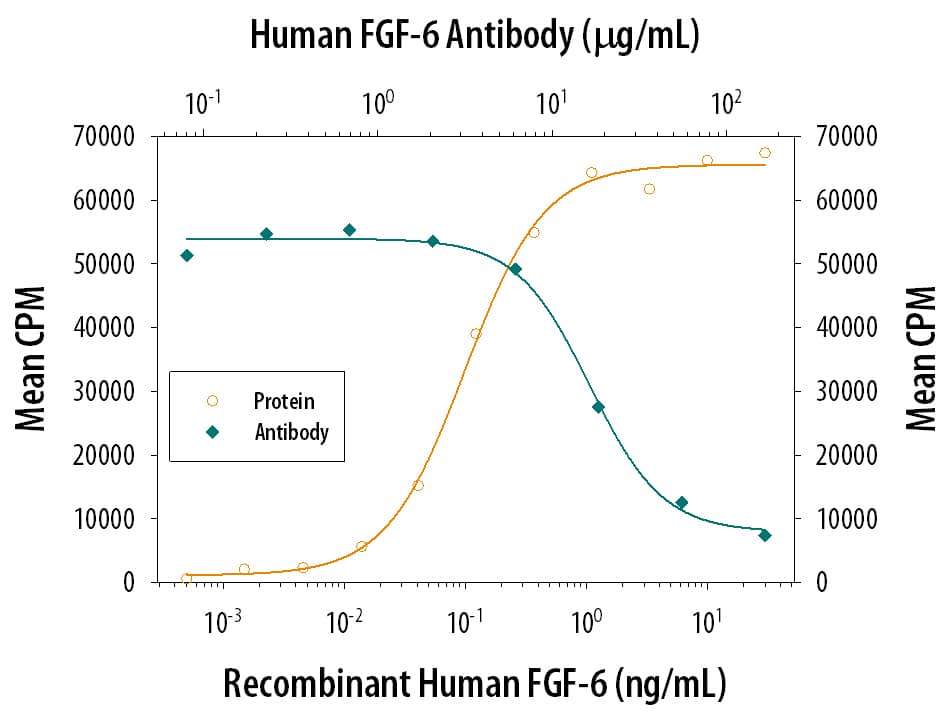Human FGF-6 Antibody Summary
Gly41-Ile208
Accession # P10767.4
Applications
Please Note: Optimal dilutions should be determined by each laboratory for each application. General Protocols are available in the Technical Information section on our website.
Scientific Data
 View Larger
View Larger
Cell Proliferation Induced by FGF‑6 and Neutralization by Human FGF‑6 Antibody. Recombinant Human FGF-6 (Catalog # 238-F6) stimulates proliferation in the NR6R-3T3 mouse fibroblast cell line in a dose-dependent manner (orange line). Proliferation elicited by Recombinant Human FGF-6 (1 ng/mL) is neutralized (green line) by increasing concentrations of Goat Anti-Human FGF-6 Polyclonal Antibody (Catalog # AB-238-NA). The ND50 is typically 15-25 µg/mL.
Reconstitution Calculator
Preparation and Storage
- 12 months from date of receipt, -20 to -70 °C as supplied.
- 1 month, 2 to 8 °C under sterile conditions after reconstitution.
- 6 months, -20 to -70 °C under sterile conditions after reconstitution.
Background: FGF-6
Fibroblast Growth Factor-6 (FGF-6), also known as HST-2, is a 25-28 kDa member of the FGF family of heparin binding polypeptides which are potent regulators of cell proliferation, differentiation, and function. FGF proteins contain a 120 amino acid (aa) core FGF domain that exhibits a beta -trefoil structure (1, 2). Mature human FGF-6 is a 171 aa protein that shares 94% aa sequence identity with mouse and rat FGF-6 (3). It binds and signals primarily through FGF R1c, 2c, and 4 (4). FGF-6 functions as a mitogen for fibroblasts, vascular endothelial cells, and prostate carcinoma cells, and N-linked glycosylation is required for the full mitogenic effect (5‑7). FGF-6 expression is restricted to skeletal muscle during development although it can be upregulated in prostate cancer and Kaposi sarcoma (7-9). In the adult, FGF-6 is upregulated in injured skeletal muscle and is required for muscle regeneration (10). FGF-6 inhibits the terminal differentiation of myoblasts and also cooperates with TGF-beta 2 to promote chondrogenesis in embryonic somites (8, 11).
- Wiedlocha, A. and V. Sorensen (2004) Curr. Top. Microbiol. Immunol. 286:45.
- Mohammadi, M. et al. (2005) Cytokine Growth Factor Rev. 16:107.
- Marics, I. et al. (1989) Oncogene 4:335.
- Ornitz, D.M. et al. (1996) J. Biol. Chem. 271:15292.
- Pizette, S. et al. (1991) Cell Growth Differ. 2:561.
- Asada, M. et al. (1999) Growth Factors 16:293.
- Ropiquet, F. et al. (2000) Cancer Res. 60:4245.
- de Lapeyriere, O. et al. (1993) Development 118:601.
- Li, J. et al. (1993) Cancer 72:2253.
- Floss, T. et al. (1997) Genes Dev. 11:2040.
- Grass, S. et al. (1996) Development 122:141.
Product Datasheets
FAQs
No product specific FAQs exist for this product, however you may
View all Antibody FAQsReviews for Human FGF-6 Antibody
There are currently no reviews for this product. Be the first to review Human FGF-6 Antibody and earn rewards!
Have you used Human FGF-6 Antibody?
Submit a review and receive an Amazon gift card.
$25/€18/£15/$25CAN/¥75 Yuan/¥2500 Yen for a review with an image
$10/€7/£6/$10 CAD/¥70 Yuan/¥1110 Yen for a review without an image
